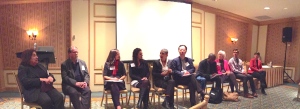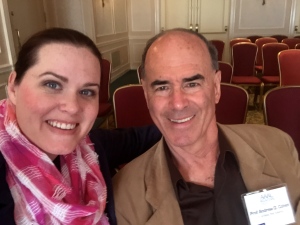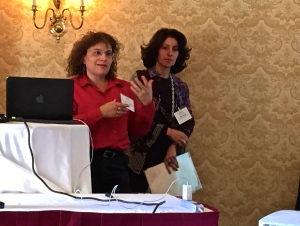Nerd alert: I LOVED my first AAAL experience. The talks, the people, the vibe: all of it was enlightening and exciting. And of course, exhausting. I’ve hunkered down in my hotel room, armed with room service and Netflix, trying to rest up before tackling TESOL in the morning, but I did want to capture my experience before passing out!
Over the last two days, I saw as many talks as I could, but I want to share the three I found to have resonated the most with me, and that I thought were pretty powerful.
1. Rivi Carmel and Miri Yochanna, Kibbutzim College of Education, Israel; “Attitudes, Perceptions and Identities of Jewish and Arab Students in Israel: Can English Provide a Potential Bridge?”
Sequestered away in a room on the first floor were two women who are trying to change the world through language. And this is not hyperbole. In their study, Carmel and Yochanna explored English as a bridge between Arab and Jewish students in Israel. The 24 participants (12 Arab, 12 Jewish) taught in primary schools opposite their group, in addition to having encounters with all participants in the program. The experience only lasted a few weeks, but Carmel and Yochanna felt that it was a positive one. While many programs in Israel may have intergroup encounters such as these, this study was unique in that it introduced a practical component: that of teaching English. In this situation, English was neutral territory in a country where tensions are high and trust is low between Arabs and Jews. While pre and post testing showed that were no significant changes in attitudes, social distance or interpersonal threat, the goal of using English as a bridge towards understanding between the two groups is not insignificant, in my opinion. I wish this talk had had more visibility. Work like this is so important, especially in such a high stakes environment. One of my favorite quotes from one of their participants was “basically, we are the same.” And this is true in any language.
2. Leketi Makalela, Witswatersrand University in South Africa

Colloquium discussion. Makalela is fourth from right.
Makalela’s talk was part of the colloquium on “Bilingual and Multilingual Education in our Globalized World”. Like many of his colleagues that encourage translanguaging and multilingualism, he calls for educators to recognize and affirm multilingual identities. He also argues that bilingual education should not be a one-size-fits-all approach, and that we need contextual approaches to education. Yes! He provided a history of language colonization of sub-saharan Africa and talked about how Africans were enslaved in the spaces created by colonization–that while they were taught to have basic skills in English or French, for example, students could no longer express deeper thoughts or feelings. And while now, in South Africa, students have the right to choose to receive education in the official language of their choice for at least the first few years, the monolingual model is still a factor, and doesn’t address the very real multilingual identities of the people. Coining the phrase “ubuntu translanguaging” Makalela wants to reorient the educational lens to include multilingual spaces that do not focus solely on one language. “He calls for “ubuntu interdependence multilingualism”, where “Ubuntu” is the idea that “I am because you are”, so in this context, “one language is because another is.” (Makalela) I think it is beautiful AND possible, and I am going to resist the monolingual model as much as I can in the constraints I have been given as a student teacher. I will definitely be looking out for Makalela’s future work.
3. Amy Jo Minett and Sarah Dietrich, Salem State University, Massachusetts; “Intergroup Conflict and Identity: English Language Teaching and the Context of Iraq”
First of all, what sensitivity towards the participants of their study. The authors have conducted interviews with participants in various English language aid programs in Iraq, and they were so careful not to reveal identifying details. Well, yes, that’s typical of most studies one would say, but the consequences of having one’s identity revealed in this situation could be fatal. The authors explored social identity in their study, and for the presentation they concentrated on one participant in particular. When I speak English, I don’t really think of the implications of speaking the language. When it comes to learners in Iraq, it could very well mean death. While English proved to be a medium for modernity and a means to bring education to a community, it could also mean association with the Western “enemy” (the enemy as described by ISIS or ISIL, etc.). People literally take a chance with their lives when learning English in Iraq presently, and English professors, all professors really, are possible targets by this group. I was humbled by this talk, because I take my abilities to express myself in any language I choose for granted, really. Minett and Dietrich reminded us that language learning can be a source of conflict. We tend to think about the conflict a learner goes through during the process of learning, but little do we think about what it means when that conflict is a very real, tangible thing that can be dangerous for an individual. While not the kernel of hope that Carmel and Yochanna presented, the study highlights the importance of looking at the impact of language teaching and its very real consequences.
 A highlight of today was my chance to get to know applied linguistics pioneer, Andrew Cohen. His work on strategies has been so important in my shaping how I see myself as a language teacher, and I really enjoyed hearing him talk about the early beginnings of language immersion programs in this country. I had had the privilege to be part of a Skype session with him in one of my classes at Carnegie Mellon. If you ever get the chance to hear him give a talk, get a front row seat. you will not be disappointed.
A highlight of today was my chance to get to know applied linguistics pioneer, Andrew Cohen. His work on strategies has been so important in my shaping how I see myself as a language teacher, and I really enjoyed hearing him talk about the early beginnings of language immersion programs in this country. I had had the privilege to be part of a Skype session with him in one of my classes at Carnegie Mellon. If you ever get the chance to hear him give a talk, get a front row seat. you will not be disappointed.
I consider myself lucky that my husband is in dual-parent mode while I am learning about all of these wonderful things happening in the world of applied linguistics. (Don’t ask me to define it though! And for the record, neither can Matsuda!) Would that a pensieve really existed, and I could extract all of the knowledge from these great minds and just transfer it directly! But until then, that’s what AAAL is for. Je vous vois next year, y’all. Or at TESOL, mañana!

